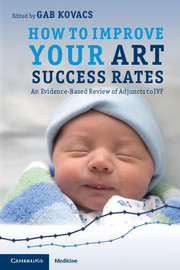Book contents
- How to improve your ART success rates
- How to improve your ART success rates
- Copyright page
- Contents
- Contributors
- Section 1 Patient selection and preparation
- Chapter 1 Pre-treatment hormone assessment to optimize IVF outcomes
- Chapter 2 Role of pelvic ultrasonography in the selection and preparation of patients for IVF
- Chapter 3 Is pre-IVF laparoscopy/hysteroscopy worthwhile?
- Chapter 4 The management of fibroids and polyps
- Chapter 5 Immunological screening in women undergoing IVF
- Chapter 6 Natural killer cell analysis
- Chapter 7 How to improve your IVF success rate:
- Chapter 8 Do vitamins and natural supplements improve pregnancy rates?
- Chapter 9 Polycystic ovary patients – is there a role for metformin?
- Chapter 10 How to improve your IVF pregnancy rate:
- Chapter 11 Management of hydrosalpinges
- Section 2 The role of AIH before IVF
- Section 3 Stimulation
- Section 4 Monitoring
- Section 5 Laboratory
- Section 6 Embryo transfer
- Section 7 Ancillary treatments
- Section 8 Assessment of results
- Index
Chapter 1 - Pre-treatment hormone assessment to optimize IVF outcomes
from Section 1 - Patient selection and preparation
Published online by Cambridge University Press: 05 July 2011
- How to improve your ART success rates
- How to improve your ART success rates
- Copyright page
- Contents
- Contributors
- Section 1 Patient selection and preparation
- Chapter 1 Pre-treatment hormone assessment to optimize IVF outcomes
- Chapter 2 Role of pelvic ultrasonography in the selection and preparation of patients for IVF
- Chapter 3 Is pre-IVF laparoscopy/hysteroscopy worthwhile?
- Chapter 4 The management of fibroids and polyps
- Chapter 5 Immunological screening in women undergoing IVF
- Chapter 6 Natural killer cell analysis
- Chapter 7 How to improve your IVF success rate:
- Chapter 8 Do vitamins and natural supplements improve pregnancy rates?
- Chapter 9 Polycystic ovary patients – is there a role for metformin?
- Chapter 10 How to improve your IVF pregnancy rate:
- Chapter 11 Management of hydrosalpinges
- Section 2 The role of AIH before IVF
- Section 3 Stimulation
- Section 4 Monitoring
- Section 5 Laboratory
- Section 6 Embryo transfer
- Section 7 Ancillary treatments
- Section 8 Assessment of results
- Index
Summary
- Type
- Chapter
- Information
- How to Improve your ART Success RatesAn Evidence-Based Review of Adjuncts to IVF, pp. 1 - 6Publisher: Cambridge University PressPrint publication year: 2011



